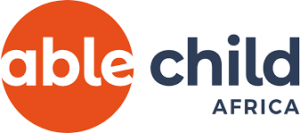[Patrick is in his family’s hut]
Voiceover >> Patrick is 15 years old. He was born deaf, in this remote region of northern Uganda there are no schools for deaf children. In his whole life, Patrick’s never had a conversation.
Reporter >> [signing to him] Hello. Good?
Voiceover >> His father, Charles, looks after him. They’re only able to communicate through very basic gestures.
Charles (translated from spoken language) >> If I spoke to him as I am speaking right now, he doesn’t understand, but I can do like this… [he raises his hand] and point at him to get the hoe so that he goes to the garden.
Voiceover >> We’ve been sitting here talking about Patrick in front of him and, while he’s been watching us, he doesn’t understand what we’re saying. It feels almost rude, but this is what Patrick’s life is like all the time.
Voiceover >> I’m here with someone who wants to change all that. Raymond Okelo is deaf himself and a sign language teacher.
Reporter >> Do you think he could learn sign language?
Raymond (translated from signing) >> I think I can teach him easily. In the past I was also like him. I couldn’t use sign language. The only thing I could do was hide in fear.
Reporter >> This is pretty much Patrick’s existence – his father gestures to him what he wants him to do and when he’s finished he goes back to his hut to spend the rest of the day on his own.
Voiceover >> Patrick’s fate is not unusual. The majority of deaf people in Sub-Saharan Africa have never been taught sign language. Unable to communicate with others, they’re trapped in their own minds.
Voiceover >> Raymond became deaf as a child after a bout of malaria. Six months ago he travelled to the capital for intensive training in sign language.
[Raymond is setting up chairs in a classroom]
Voiceover >> Now he has returned to his village to do something unprecedented – he’s going to teach the first sign language course ever set up here.
Reporter >> Raymond, are you nervous?
Raymond (translated from signing) >> No, I’m not. I am happy that deaf people will be coming to learn
Voiceover >> It is two o’clock, the first deaf students start turning up and class begins.
Reporter >> The course has already started but Patrick hasn’t turned up yet, and I’m worried that his father couldn’t convince him to leave home.
Voiceover >> A few minutes later, Patrick arrives.
[Patrick sits in a seat, and looks uncomfortable, like he doesn’t want to be there]
[Raymond, at the front of the class, points to a picture of a cow on a poster and makes the sign for a cow. The people in the other chairs make the same sign. Patrick looks confused, looking between the picture and the signing.]
[Raymond points at a rabbit, makes the sign and the people in the class also make the sign. Patrick’s eyes light up, and there’s the trace of a smile on his face as he looks at Raymond.]
[Patrick start to grin, as Raymond points at a poster of sign language letter shapes. Raymond makes the sign, and Patrick does the same.]
[Patrick is now signing with the rest of the students.]
Reporter >> Patrick’s transformation is amazing. It’s almost impossible to believe it’s the same boy we met yesterday.
Voiceover >> New deaf students keep arriving. Many have walked miles to be here. There’s a nine-year-old boy and an 80-year-old woman. Before the end of the class, each new student goes to the front. The class votes on a new name for them.
[The name that they have chosen for Patrick is the sign for a smile]
Voiceover >> This is now Patrick’s sign name and he will use it for the rest of his life. He has just been baptised into a whole new world.
 Ethiopaid, with a focus on the services provided by Cheshire Ethiopia to children with disabilities to help them fulfil their potential.
Ethiopaid, with a focus on the services provided by Cheshire Ethiopia to children with disabilities to help them fulfil their potential. Able Child Africa, who work with local partners to protect, educate and empower children with disabilities so they are able to fulfil their potential
Able Child Africa, who work with local partners to protect, educate and empower children with disabilities so they are able to fulfil their potential
